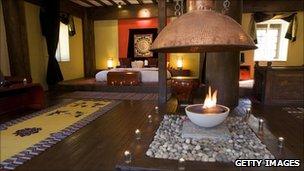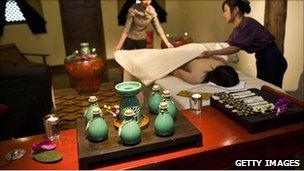From prisoner to millionaire: The Banyan Tree story
- Published
Ho Kwon Ping is the founder of Banyan Tree, a worldwide chain of luxury resorts based in Asia.
For someone now running a large multinational company, Ho Kwon Ping's early career is perhaps surprising.
"I belonged to the baby-boom generation" he says. He attended Stanford University in California, and protested against the Vietnam war. Later, whilst working as a journalist, Mr Ho ended up in jail in Singapore as a result of controversial articles he'd written for the Far East Economic Review. He describes his two months in prison as a "sobering experience."
"You realise in solitary confinement who you are and who you are not," he says. "I realised I was not a Nelson Mandela. I was not ever going to be. The causes for which I might have been imprisoned were not the causes that…I really could identify with."
Nevertheless, Mr Ho feels that he and many of his generation have not completely lost touch with the spirit of those times. "Many of those people who were young, idealistic and got into jail or got kicked out of universities, and are successful people today, haven't forgotten their ideals. They've just found different ways to express them."
Ho Kwon Ping says his experience changed his life. While in jail, he was prompted to propose to his wife. "All the time when I was inside prison, I could see my parents…but I couldn't see the woman who is now my wife."
What did she make of his proposal? "That's my idea of romance…I think it was romantic. She probably doesn't think so," he says impishly.
Idyllic
After his release Mr Ho continued to work as a journalist, settling on one of Hong Kong's offshore islands with his wife.

Banyan Tree now has hotels as far apart as Mexico and the Seychelles
They lived in a small fishing village. But despite the fact that they were "pretty impoverished", he says it was an "idyllic" period of time. Indeed his company is named after Banyan Tree Bay where they lived for three years.
"We wanted to choose a name that evoked, at least to us, the values which we think Banyan Tree stood for and that was…romance and intimacy," he explains. He points out that this is not limited to "hot blooded young couples."
"It can be the romance of travel, the romance of being in a beautiful fishing village… and that is essentially the essence of Banyan Tree… captured, I think, in the origins of the name itself."
Ho Kwon Ping's foray into the business world came several years later when he decided to join the family business after his father suffered a stroke. He says he quickly decided that it needed a completely new direction.
"The primary thing that we were doing, which I felt was not viable and which today remains to me in many ways the curse of Asian businesses, was contract manufacturing… just a technical term for being a sub-contractor."
He explains: "You never owned the market, you never owned the brand…the margins are squeezed all the time."
"I decided we had to have a brand and we had to be global in nature… With that intent, I needed to find some business other than what we were doing," he says.
The opportunity came when a hotel they built in Phuket in Thailand was proving difficult to let because of its lack of a beach front.
"Necessity really is the mother of all creativity and we are a living example of that," he says. In his endeavour to attract guests to the hotel, Ho Kwon Ping was inspired to build villas rather than rooms, each with its own swimming pool.
Ingenuity
The same line of thought led him to create one of Banyan Tree's feature attractions: the hotel spa.
He says that without the initial problem he wouldn't have been stretched to build a hotel different to the rest. "I've always believed that sometimes it is in solving a problem that great ideas come forth… Adversity is not a bad thing. That's how Banyan Tree was born - because we had no beach front."
But Mr Ho admits his originality didn't always sit well with others, supposedly more expert in the hotel industry. Consultants he hired refused to accept that the tropical spa could be adapted from the European model and they quit in exasperation.

"Basically we threw the whole spa book out on its head," says Mr Ho
He says his resilience taught him a lesson: "You never should try to be what you are not. What you have, whatever disadvantages you may have, is what you have and... you have to create something unique out of it."
"Basically we threw the whole spa book out on its head…I said we'll have spa therapists who'll go around barefoot because going around barefoot is a sign of respect in Asia…they were to wear Asian clothes [not white uniforms]."
However, he wasn't always confident of success. "Having an entrepreneur's mindset, you have to be prepared for everything," he says. "If Banyan Tree Phuket failed, I'd have gone back to the drawing board to look for something else to hang a brand on. You have to experiment, you have to be open to the idea that things may or may not work."
Global appeal
Banyan Tree now has hotels as far apart as Mexico and the Seychelles. Mr Ho says branding and flexibility are important factors in global expansion. Yet he believes this is particularly difficult for Asian businesses.
He says that Asian brands resonate easily with Asian customers but exporting that relationship to a global level is far more strenuous as "the main markets in the past fifty years have been in the West."
However, Mr Ho is optimistic that the expansion of Asia as a consumer market will turn the tide as Asian businesses grow to understand "what the consumers want because the market is one which they themselves come from".
And he is adamant that businesses can achieve universal appeal without sacrificing their cultural heritage. It is something he tries to apply to his own business: "When I do a Banyan Tree in Morocco will [customers] come because they're going to see a Thai resort there or will they come because they know that Banyan Tree will bring certain attributes and certain service standards and a certain service culture… so that when they go to Morocco they can see the best of Morocco there?".
Mr Ho believes the key to success lies in the ability to give customers "a true sense of place, wherever you are".